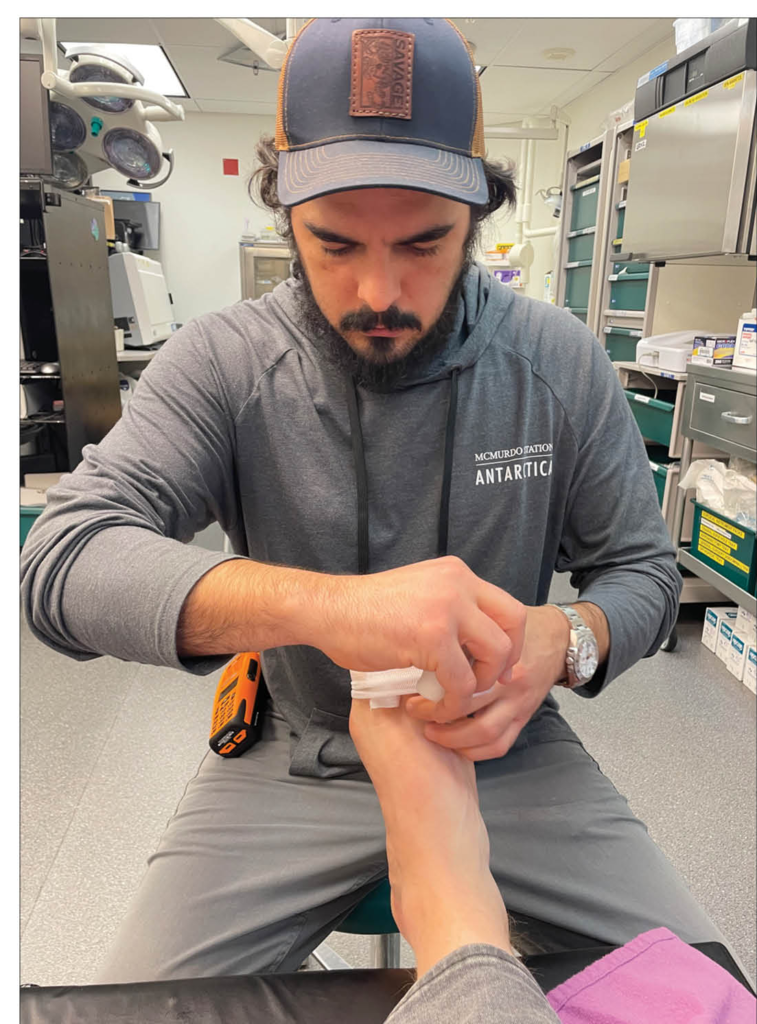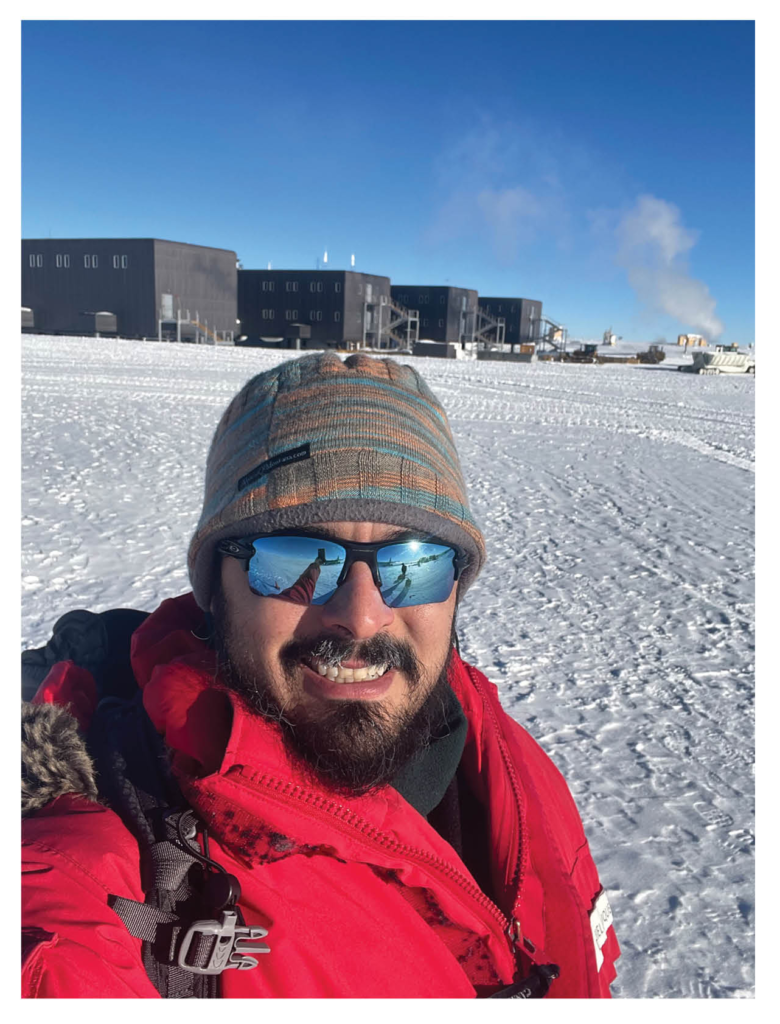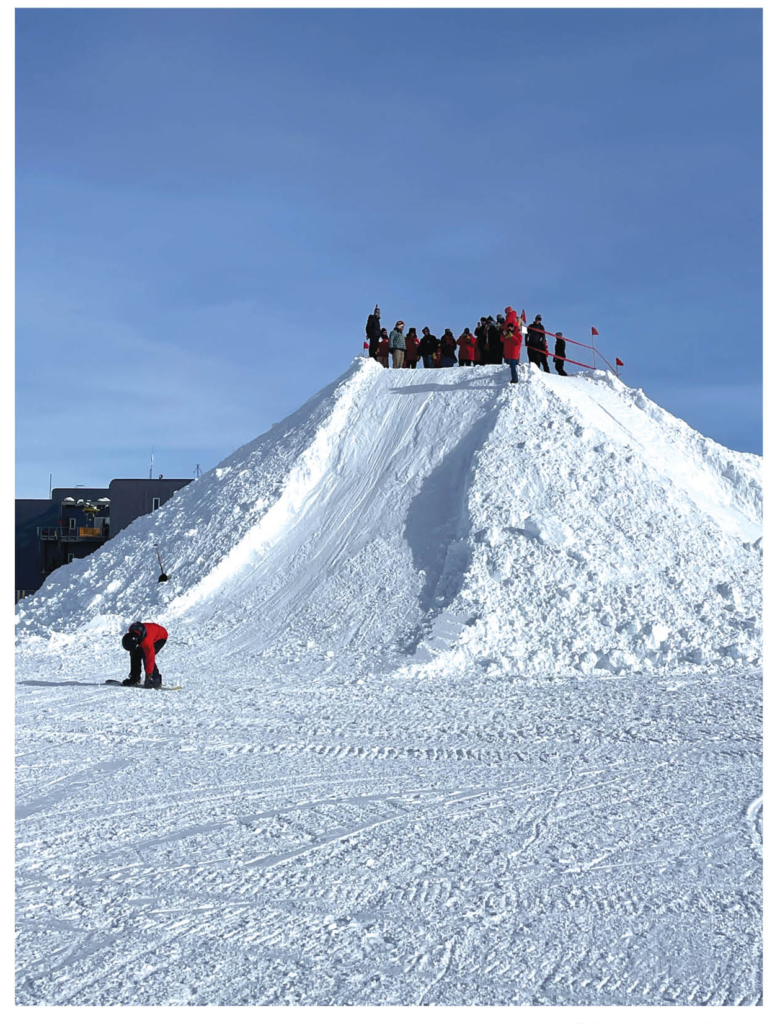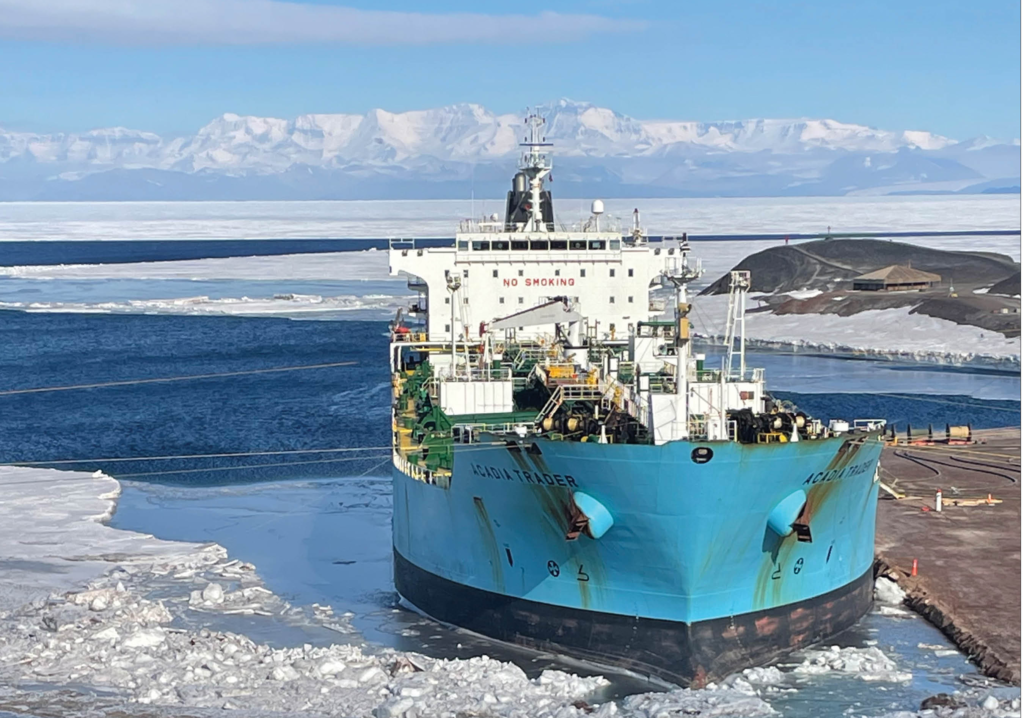By Deborah Latter
Photography Courtesy Daniel Duque
Daniel Duque returned home to Lakeland in February after working 90 degrees south of everywhere on earth. His office was a mere 150 feet from the geographical South Pole at the Amundsen-Scott South Pole Station, where he spent four months providing medical care in the facility’s clinic. He joked that he could “walk around the world in a few steps.”
Duque earned his Associate in Science in Nursing from South Florida State College in Avon Park in 2016. While working on his nursing degree, he wondered how far his nursing career could take him. He searched the internet for opportunities to travel as a nurse. Those searches brought him to the University of Texas Medical Branch (UTMB), which is considered a gateway to working “on the ice.”
“Everyone in Antarctica – ‘the ice’ – works as a contractor or National Science Foundation (NSF) grantee,” Duque said. “The NSF is the parent organization that is in charge of all science projects. Support staff, such as cooks, medical, logistics, facility maintenance, and so forth are hired under subcontractors to the NSF. All companies make bids to the NSF to get the contract. If you want to work in medical in Antarctica, the UTMB is your only option. The UTMB has an Aerospace Medicine Residency program for their medical residents, and Antarctica is often used as an analog to conditions found in space. So, it made sense for UTMB to have the contract.”
Duque, who came to the United States from Havana, Cuba when he was 7 years old, was raised in Thonotosassa, FL. He was on active duty with the U.S. Army from 2008 to 2013. He said that he joined the Army because his family had few financial resources. When he joined, he decided to take the most difficult job the Army had to offer – Army Special Forces, the Green Berets. “It gave me the opportunity and resources to invest in myself,” he said. “And I was able to pay my way through college.”
Duque’s interest in becoming a nurse began while serving in the Army in Afghanistan. “I was introduced to a mobile trauma unit,” he said. “We had C-130 planes retrofitted with a surgical center. The mobile trauma unit also brings basic equipment that saves lives on the field of battle. I had the opportunity to speak with a surgeon, a nurse anesthetist, a physician’s assistant, and a nurse. That experience made a profound impact on my life. In war, almost anyone is capable of taking a human life. But here was a small group of men and women who could save a human life.”

After he was honorably discharged from the Army, Duque and his wife moved to Lakeland, but he chose to attend SFSC for nursing school. “SFSC’s Nursing program had a great reputation,” he said. “Its passing score for the National Council Licensure Examination (NCLEX) was really high. I can’t recall how much my Associate Degree in Nursing (ADN) cost me — something like $9,800. But it was one of the best returns on investment of my life.”
Duque joined the Florida National Guard in 2013. Shortly after earning his Nursing degree and becoming a registered nurse, he was deployed to the Democratic Republic of Congo for nine months. “While my main job wasn’t nursing, I was able to help people by using the skills I gained during my training,” he said. “During my time off, I helped in a clinic.”
Upon returning from Africa, Duque started working toward his Bachelor of Science in Nursing (BSN) at the University of South Florida (USF) and graduated in 2018. He continued his education, earned his Master of Science in Nursing (MSN) from USF in 2020, and became a family nurse practitioner.
After completing his master’s degree, Duque applied to the UTMB, interviewed with the director, and was offered a job. However, the COVID-19 pandemic put his aspirations and travel around the world on hold. In 2023, he interviewed again and was offered a position in the South Pole.
What interested me about the job was the remote location,” Duque said. “The South Pole station is often compared to the International Space Station in that it is one of the most remote and austere environments on earth. NASA often performs experiments there which directly apply to astronauts and space travel.”
Duque and a single physician worked in a clinic six days a week from 7:30 a.m. to 5:30 p.m. The clinic has three sections: an urgent care/emergency trauma bay, a dental suite, and in-patient care/long-term care. Over the winter months, 42 people will serve on the station. In the summer, the population swells to nearly 130 people.
“The physician and I were the sole medical providers for over 800 miles,” Duque said. “We cared for men and women ranging from 21 to 70 years old. This included dental procedures, taking X-rays, running our own labs, physical therapy, pharmacy, and so forth. But we had plenty of time to provide good evidence-based practice and build lasting relationships with our patients. We were able to gain the trust of our patients.”
The most common medical visits on the station are related to the climate. The high altitude and dry climate lead to acute mountain sickness, frostnip (the stage before frostbite begins), dehydration, sleep deprivation, and work-related injuries.

The environment at the South Pole is harsh. According to Duque, a relatively warm temperature at the South Pole is minus 30.7 C (minus 23 F) with a wind chill factor of minus 41.1 C (minus 42 F). Although the majority of Antarctica is at sea level, the Amundsen-Scott South Pole Station is at the top of a polar plateau, at an elevation of 9,306 feet above sea level.
“Due to this environment, all personnel are given preventive care prior to arrival at the South Pole Station,” Duque said. “The first five days on the station are the most dangerous. During this time, we’re most likely to see acute mountain sickness (AMS), high altitude pulmonary edema (HAPE), or high- altitude cerebral edema (HACE). The last two are potentially deadly illnesses if not treated. Ironically, a person’s age, sex, body habitus, and even previous visits to high altitude locations tell us little of who is at risk.”
“The most rewarding part about the job was being able to provide care for world-class scientists and support staff and learn about airborne geophysics, glaciology, astronomy, neutrino and dark matter physics, weather, astrophysics, and drilling through ice to depths of 1,450 to 2,450 meters below the surface.”
Duque returned to the United States at the end of February. He and his wife purchased a 5-acre farm in Lakeland, which they plan to develop into a homestead.


Since he’s been back home, he’s been building rabbit cages, mowing, and planting fruit trees around the farm. He’s also applied to become an officer in the National Guard and plans to return to running his signage company in Tampa, a craft brewery in South Carolina, and his clinical practice.
“If someone is younger or, perhaps, has the freedom to travel (after kids have left the house), traveling as a nurse offers you a paid opportunity to see different parts of the world. Young people can build up their savings and start investing. More settled people can travel together and become immersed in places they might not otherwise have been able to visit.
“I’m proud, honored, and humbled to have gotten the opportunity to work alongside some of the most brilliant people on the planet,” Duque said of his experience at the Amundsen-Scott South Pole Station. “I witnessed cutting-edge science taking place. It’s only made possible by the hard work, commitment, and dedication of the residents working and living at the Pole.”



